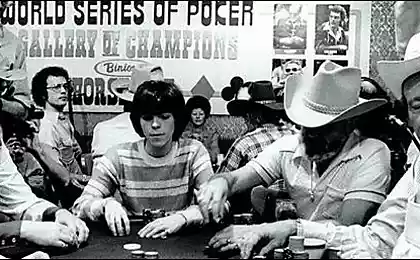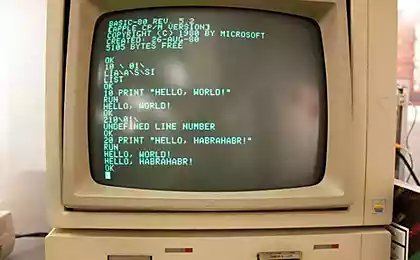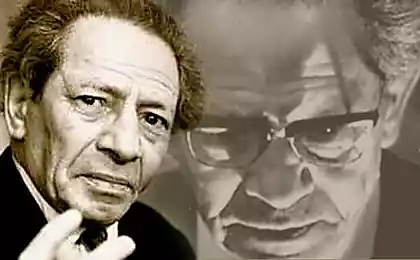1002
People with incredibly phenomenal memory
Human-computer
Locksmith from Lipetsk AV Nekrasov able to mentally extract roots level from two to thousands of numbers, consisting of ... a few hundred digits. Before the bill he is preparing (concentrates) for several tens of minutes. At the same time he begins to shake his head. Then asks to see the tape with the figures gazed at them, and after 20 seconds, staring into space, begins to dictate the answer. The first five numbers he calls correctly, and the sixth is the result of subsequent rounding of numbers.
Nekrasov said: the number of answers is mind's eye "in the form of numbers in the balls." The experiments confirm that it has telepathy, telekinesis.
Only once heard ...
Once the composer S.I.Taneevu (1856 - 1915) came A.K.Glazunov (1865 - 1936) to play him just wrote a piece of music. Who loved to make fun of Taneyev before hid in another room of Sergei Rachmaninoff, then - a student of the Conservatory. When finished playing Glazunov, Taneyev called Rachmaninoff. The young man sat down at the piano and, to the great surprise of the author, repeated all his work. The composer was puzzled sheet works have not been seen. The fact is that Rachmaninoff could play from memory he had heard only once melody.
WITHOUT prompter
The great Russian singer Feodor Chaliapin (1873 - 1938) when the opera was not limited to studying only his vocals. He kept in mind the entire score of the opera and knew all her solo, choral and orchestral parts. His partners in the scene claimed that he had never used the services of a prompter. For example, in Mussorgsky's "Boris Godunov" Chaliapin knew by heart all the male and female roles: Godunov, Shumsky, Pimen, the Pretender, Varlaam, Marina Mniszek. He had at various times to perform the party Boris Pimen and Varlaam.
BLIND TO 32 board
The first Russian world chess champion Alexander Alekhine (1892 - 1946) had an extraordinary memory capacity. He knew and could play any of them played before games. In 1932 Alekhine gave a simultaneous blindfold on 32 chessboards.
9 books a day
Nikolai Rubakin (1862 - 1946) - the famous Russian educator, bibliographer, writer and publicist - lived '84. He had a talent for extremely fast reading. Rubakin himself claimed that in his adult life he had read about 200 thousand books. If we assume that he began to read from the age of ten, it turns out that on the day he read an average of 9 books.
"The man who remembers all»
So the doctors called a reporter a Moscow newspaper Shereshevskii that is easy to memorize the table with a lot of numbers, large combinations of words unknown to him language, complex formulas (by the way, that he did not understand, much easier to memorize than meaningful).
For Shereshevskii conducted scientific observations for about 30 years, starting from 1926. Experiments have consistently recorded. Shereshevskii could remember the enormous amounts of information. It was also found that his memory - the absolute strength of memorization: 20 years later he was asked to play once heard a table of numbers, Shereshevskii closed his eyes and slowly moved his finger in the air and called all the numbers of the table without a single mistake. This is an absolute record "old memory».
Shereshevskii had eidetism - peculiar kind of visual memory. As dictated by the numbers, he saw them wrote to his clear handwriting on the board or paper, and they were placed on columns 4-6 in the series. Remembering the words he used to commit mentally walk from Pushkin Square on Gorky Street in the center and on the way "was setting" everything heard. When you play a number he seems to be repeating the route, "reading images».
IN THE MIND ... tables of logarithms
Director of the Institute of Semiconductors of the USSR Academy of AF Ioffe (1880 - 1960) memory used tables of logarithms, in which 30 million digits.
I read the book for a minute
16-year-old from Kiev Ira Ivanchenko reached speed reading 163,333 words per minute with full mastery of reading. This achievement was recorded in January 1990 in the presence of journalists, a number of Ukrainian publications. Ira went on record thanks to a special preparation of the Kyiv Center of brain training techniques of fast reading. In recognition of students of the school, many have shaped the perception of information, when the texts are perceived as an endless tape cinema.
Informal reading speed record (416 to 250 words per minute) owns the other 16-year-old from Kiev Eugene Alekseenko. The record was recorded September 9, 1989 during testing by the Centre in the presence of 20 trainees. In order to fully read, for example, a magazine as "New time", Genet took only 30-40 seconds. About a minute left in her reading a book medium format ... The contents read Jack recounted the clock, without losing the slightest details.
In 38 languages
The editor of the international department of the newspaper "Soviet Sport" Yu Solomakhin fluent in 38 languages, among which are quite rare, such as Faroese and the language of the Sorbs, which officials say one of the ethnic groups in Germany.
Maintain the linguistic form it helps daily training, listening to the radio in the languages and translation work. Solomakhin believes that its features - not the limit, and even a person of average intelligence can learn 50 or more languages.
MIRACLE-COUNTER
In the Van region of Georgia Aron Chikvashvili lives. He freely manipulated in the mind of many-valued numbers. One friend decided to check out the possibility of a miracle counter. The job was severe: many words and letters tell the announcer commenting on the second half of a football match "Spartak" (Moscow) - "Dynamo" (Tbilisi). At the same time the recorder was turned on. The answer came as soon as the announcer said the last word: 17 427 letters, 1835 words. On checking it took five hours. The answer was correct.
MAN-
CALENDAR
Within seconds, having in mind the hundreds of operations, Vladimir Kutyukov able to announce that on 1 January 180, it was Friday. He immediately answers the question, how many seconds have passed since the death of Nero before the fall of Constantinople, or some day will be October 13 28,448,723 years ... And all this is taking into account leap years, the change of the calendar in 1582, etc. difficulties, including non-decimal ratios (seven days a week, 24 hours a day, an hour to 60 minutes).
The unique ability of oral calendar calculation, which showed an engineer from Yoshkar-Ola, validated protocol test, held on 18 May 1992 in experimental design bureau of control and automation of the Mari capital.
MISTER MEMORY
So called journalists in Yerevan Samvel Gharibyan lawyer. During the experiment, in June 1990, he remembered, and almost unerringly reproduced in 1000 offered him a strange foreign words. Not knowing the language, Samvel managed to remember once and play from memory the words in Arabic, Urdu, Khmer, Bengali, English, Dari, German, Esperanto, Italian.
Having achieved remarkable success in GMS (art of memory), memory Gharibyan helped develop thousands of people of different professions. Almost all of our memories from early childhood are associated with emotions, but as they grow older, they become dull. Samvel with the help of special psychological techniques help revive emotions and put them at the service of man at work with information.
A major role in the appeal procedure and breathing exercises, contributing to the concentration of memory. S. Gharibyan has traveled at the invitation of the different countries, demonstrating their capabilities and methodology. He created correspondence "School of memory", which can learn from anyone seeking to develop their ability to memorize.
Locksmith from Lipetsk AV Nekrasov able to mentally extract roots level from two to thousands of numbers, consisting of ... a few hundred digits. Before the bill he is preparing (concentrates) for several tens of minutes. At the same time he begins to shake his head. Then asks to see the tape with the figures gazed at them, and after 20 seconds, staring into space, begins to dictate the answer. The first five numbers he calls correctly, and the sixth is the result of subsequent rounding of numbers.
Nekrasov said: the number of answers is mind's eye "in the form of numbers in the balls." The experiments confirm that it has telepathy, telekinesis.
Only once heard ...
Once the composer S.I.Taneevu (1856 - 1915) came A.K.Glazunov (1865 - 1936) to play him just wrote a piece of music. Who loved to make fun of Taneyev before hid in another room of Sergei Rachmaninoff, then - a student of the Conservatory. When finished playing Glazunov, Taneyev called Rachmaninoff. The young man sat down at the piano and, to the great surprise of the author, repeated all his work. The composer was puzzled sheet works have not been seen. The fact is that Rachmaninoff could play from memory he had heard only once melody.
WITHOUT prompter
The great Russian singer Feodor Chaliapin (1873 - 1938) when the opera was not limited to studying only his vocals. He kept in mind the entire score of the opera and knew all her solo, choral and orchestral parts. His partners in the scene claimed that he had never used the services of a prompter. For example, in Mussorgsky's "Boris Godunov" Chaliapin knew by heart all the male and female roles: Godunov, Shumsky, Pimen, the Pretender, Varlaam, Marina Mniszek. He had at various times to perform the party Boris Pimen and Varlaam.
BLIND TO 32 board
The first Russian world chess champion Alexander Alekhine (1892 - 1946) had an extraordinary memory capacity. He knew and could play any of them played before games. In 1932 Alekhine gave a simultaneous blindfold on 32 chessboards.
9 books a day
Nikolai Rubakin (1862 - 1946) - the famous Russian educator, bibliographer, writer and publicist - lived '84. He had a talent for extremely fast reading. Rubakin himself claimed that in his adult life he had read about 200 thousand books. If we assume that he began to read from the age of ten, it turns out that on the day he read an average of 9 books.
"The man who remembers all»
So the doctors called a reporter a Moscow newspaper Shereshevskii that is easy to memorize the table with a lot of numbers, large combinations of words unknown to him language, complex formulas (by the way, that he did not understand, much easier to memorize than meaningful).
For Shereshevskii conducted scientific observations for about 30 years, starting from 1926. Experiments have consistently recorded. Shereshevskii could remember the enormous amounts of information. It was also found that his memory - the absolute strength of memorization: 20 years later he was asked to play once heard a table of numbers, Shereshevskii closed his eyes and slowly moved his finger in the air and called all the numbers of the table without a single mistake. This is an absolute record "old memory».
Shereshevskii had eidetism - peculiar kind of visual memory. As dictated by the numbers, he saw them wrote to his clear handwriting on the board or paper, and they were placed on columns 4-6 in the series. Remembering the words he used to commit mentally walk from Pushkin Square on Gorky Street in the center and on the way "was setting" everything heard. When you play a number he seems to be repeating the route, "reading images».
IN THE MIND ... tables of logarithms
Director of the Institute of Semiconductors of the USSR Academy of AF Ioffe (1880 - 1960) memory used tables of logarithms, in which 30 million digits.
I read the book for a minute
16-year-old from Kiev Ira Ivanchenko reached speed reading 163,333 words per minute with full mastery of reading. This achievement was recorded in January 1990 in the presence of journalists, a number of Ukrainian publications. Ira went on record thanks to a special preparation of the Kyiv Center of brain training techniques of fast reading. In recognition of students of the school, many have shaped the perception of information, when the texts are perceived as an endless tape cinema.
Informal reading speed record (416 to 250 words per minute) owns the other 16-year-old from Kiev Eugene Alekseenko. The record was recorded September 9, 1989 during testing by the Centre in the presence of 20 trainees. In order to fully read, for example, a magazine as "New time", Genet took only 30-40 seconds. About a minute left in her reading a book medium format ... The contents read Jack recounted the clock, without losing the slightest details.
In 38 languages
The editor of the international department of the newspaper "Soviet Sport" Yu Solomakhin fluent in 38 languages, among which are quite rare, such as Faroese and the language of the Sorbs, which officials say one of the ethnic groups in Germany.
Maintain the linguistic form it helps daily training, listening to the radio in the languages and translation work. Solomakhin believes that its features - not the limit, and even a person of average intelligence can learn 50 or more languages.
MIRACLE-COUNTER
In the Van region of Georgia Aron Chikvashvili lives. He freely manipulated in the mind of many-valued numbers. One friend decided to check out the possibility of a miracle counter. The job was severe: many words and letters tell the announcer commenting on the second half of a football match "Spartak" (Moscow) - "Dynamo" (Tbilisi). At the same time the recorder was turned on. The answer came as soon as the announcer said the last word: 17 427 letters, 1835 words. On checking it took five hours. The answer was correct.
MAN-
CALENDAR
Within seconds, having in mind the hundreds of operations, Vladimir Kutyukov able to announce that on 1 January 180, it was Friday. He immediately answers the question, how many seconds have passed since the death of Nero before the fall of Constantinople, or some day will be October 13 28,448,723 years ... And all this is taking into account leap years, the change of the calendar in 1582, etc. difficulties, including non-decimal ratios (seven days a week, 24 hours a day, an hour to 60 minutes).
The unique ability of oral calendar calculation, which showed an engineer from Yoshkar-Ola, validated protocol test, held on 18 May 1992 in experimental design bureau of control and automation of the Mari capital.
MISTER MEMORY
So called journalists in Yerevan Samvel Gharibyan lawyer. During the experiment, in June 1990, he remembered, and almost unerringly reproduced in 1000 offered him a strange foreign words. Not knowing the language, Samvel managed to remember once and play from memory the words in Arabic, Urdu, Khmer, Bengali, English, Dari, German, Esperanto, Italian.
Having achieved remarkable success in GMS (art of memory), memory Gharibyan helped develop thousands of people of different professions. Almost all of our memories from early childhood are associated with emotions, but as they grow older, they become dull. Samvel with the help of special psychological techniques help revive emotions and put them at the service of man at work with information.
A major role in the appeal procedure and breathing exercises, contributing to the concentration of memory. S. Gharibyan has traveled at the invitation of the different countries, demonstrating their capabilities and methodology. He created correspondence "School of memory", which can learn from anyone seeking to develop their ability to memorize.























